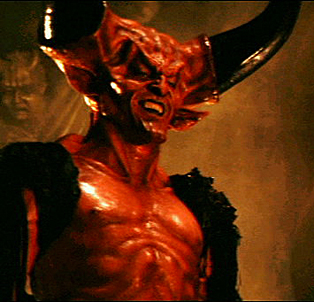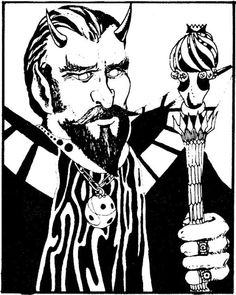When Fantasy and Theology Collide: Some Thoughts on Satan
 I recently met a woman whose father-in-law had been a federal prison guard at a medical prison that held the “Blind Sheikh” back around the time of the 9/11 terrorist attack. The Blind Sheikh (Omar Abdel-Rahman) was an associate of Osama bin Laden and the planner behind the 1993 World Trade Center bombing — one of the early “masterminds” of Al Qaeda. In other words, a real life counterpart to the nastiest, most nefarious villains in our fictional thriller novels and cinema fare.
I recently met a woman whose father-in-law had been a federal prison guard at a medical prison that held the “Blind Sheikh” back around the time of the 9/11 terrorist attack. The Blind Sheikh (Omar Abdel-Rahman) was an associate of Osama bin Laden and the planner behind the 1993 World Trade Center bombing — one of the early “masterminds” of Al Qaeda. In other words, a real life counterpart to the nastiest, most nefarious villains in our fictional thriller novels and cinema fare.
She told me that her dad-in-law spoke to the Sheikh a couple times, as could be expected: casual banter will occasionally happen between guards and the imprisoned criminals they are guarding. She said the Sheikh seemed friendly enough to her father-in-law, but she added, “The Sheikh told him that we worship three gods. That was a big issue he had with us, that we worship three gods. So much of it was cultural misunderstanding.”
It was immediately clear to me from this third-hand paraphrase that by “us” the Sheikh meant Christians, and that by “three gods” he was referring to the Trinity. Technically it’s a theological misunderstanding, and a common one. At a cursory glance it does appear that Christians worship three Gods — the Father, the Son, and the Holy Ghost. Even some early Christian sects rejected the Trinity as heretical because it seemed too polytheistic. Of course, orthodox Christians do not consider them as three separate gods but as three-in-one (a concept that is somewhat hazy even to many Christians).
I don’t know what her father-in-law said to the Sheikh, but what he could have replied with was this:
“Sheikh, do you have a body?”
“Yes.”
“Do you have a soul?”
“Yes.”
“Do you have a spirit?”
“Yes.”
“And are you still one person?”
That is, at best, an imperfect analogy of the doctrine of the Trinity, but it’s a starting point.
But the bigger issue here for most of us is that, whether someone believes in one god or three gods or a whole pantheon of gods or NO gods, none of that is a good reason to blow someone up.
 And this is where I want to pivot to the most notorious, infernal supervillain of all time, infamous in the world’s great religions and bestselling works of fantasy, the guy who has been adored by a few but feared by billions: the Devil. Old Nick. Mr. Scratch. Lord of Darkness and Father of Lies, the Great Dragon, perhaps best known by his old Hebraic name: Satan.
And this is where I want to pivot to the most notorious, infernal supervillain of all time, infamous in the world’s great religions and bestselling works of fantasy, the guy who has been adored by a few but feared by billions: the Devil. Old Nick. Mr. Scratch. Lord of Darkness and Father of Lies, the Great Dragon, perhaps best known by his old Hebraic name: Satan.
Satan, in the Old Testament, was actually not a proper name; it simply meant “adversary.” Only gradually did he start to be personified as a single entity. By the time of the New Testament, he was the full-on rebellious fallen angel we popularly know today.
He and his ilk — Beelzebub, Asmodeus, and all the rest of that horned coterie — have provided bogeymen to frighten children at bedtime as well as seriously psychologically traumatic threats to plunge otherwise rational adults into long, dark nights fearing for the existential state of their soul.
 He has strolled into popular entertainments to make deals — usually deals that do not bode well for the taker, although the occasional clever protagonist has managed to turn the tables on Old Scratch. Sometimes he is just misunderstood, burdened with the unbearably heavy job of being King of Hell; feeling burnt out, he has abdicated his throne to take a vacation, offering the position to other gods and deities. He has teamed up with the Winchester brothers against a common foe. His minions give Buffy no end of trouble when what she’d rather be doing is slaying (or shagging) vampires. He inspired some cool ‘70s heavy metal album art. His offspring sometime become reluctant superheroes. In modern popular culture, like in the frescoes and bas-reliefs of an old cathedral, he is all over the place.
He has strolled into popular entertainments to make deals — usually deals that do not bode well for the taker, although the occasional clever protagonist has managed to turn the tables on Old Scratch. Sometimes he is just misunderstood, burdened with the unbearably heavy job of being King of Hell; feeling burnt out, he has abdicated his throne to take a vacation, offering the position to other gods and deities. He has teamed up with the Winchester brothers against a common foe. His minions give Buffy no end of trouble when what she’d rather be doing is slaying (or shagging) vampires. He inspired some cool ‘70s heavy metal album art. His offspring sometime become reluctant superheroes. In modern popular culture, like in the frescoes and bas-reliefs of an old cathedral, he is all over the place.
Which brings me back to the Blind Sheikh and his myopic interpretation of Christian doctrine. If you are going to hurt innocent people in the name of your god, I really don’t care if you call your god Yahweh or Allah or Betty Crocker: the actions, not the name, reveal whom you serve. This is the work of the Adversary. You serve Satan.
This is something I think we can all agree on whether one believes in an actual Satan or not. I lean towards not, although even if there is not an actual entity that could be identified as Satan there is clearly a Satanic force at work in the world, empowered by the collective unconscious.
What do I mean? Let me give you a more benign example. I don’t think there is an actual flesh-and-blood Santa Claus, yet millions of toys appear without fail under trees and in stockings around the world each year on the morning of December 25. We created Santa, and we created Satan too. (Is it mere coincidence that their names are an anagram? Probably.)
Something doesn’t have to be real to be served. It is imbued with a secondary life from its animators; and can, then, in a sense, take on a life of its own.
 Dylan once sang, “You gotta serve somebody. It might be the Devil, or it might be the Lord, but you gonna have to serve somebody.” And, hey, he won the Nobel Prize in Literature last year, so what was he talking about? Well, at the time he was going through his zealous evangelical phase, so he was probably being pretty literal. But there’s a broader interpretation that can be applied even if one does not believe in a literal Lord or Devil. Every action you take will serve good or ill, will hurt or heal, will reveal or conceal (Sorry. Not sure why I slipped into rhyming mode there. Maybe because I was just listening to Dylan).
Dylan once sang, “You gotta serve somebody. It might be the Devil, or it might be the Lord, but you gonna have to serve somebody.” And, hey, he won the Nobel Prize in Literature last year, so what was he talking about? Well, at the time he was going through his zealous evangelical phase, so he was probably being pretty literal. But there’s a broader interpretation that can be applied even if one does not believe in a literal Lord or Devil. Every action you take will serve good or ill, will hurt or heal, will reveal or conceal (Sorry. Not sure why I slipped into rhyming mode there. Maybe because I was just listening to Dylan).
Point is, regardless what name an action is taken under, the action speaks for what or whom it serves. If a person murders people in the name of Jesus, he has served Satan. If a person murders people in the name of Allah, he has served Satan. If a person murders people in the name of Buddha or Vishnu or the Flying Spaghetti Monster, he has served Satan.
A similar point was made by C.S. Lewis in his children’s fantasy book The Last Battle (the seventh and final book in The Chronicles of Narnia, published in 1956). In that book, a soldier from the Calormene army finds himself in the presence of Aslan. He falls in worshipful awe and wonder at Aslan’s feet, and is remorseful that he spent his life serving the god Tash. He is prepared to be slain, but Aslan accepts him and reveals to him a startling (and, to some readers, theologically controversial) fact: “Child, all the service thou hast done to Tash, I account as service done to me.”
 Now, this didn’t sit well with some fundamentalist Christians because it sounded awfully close to a sort of universal Unitarianism (a point which Aslan himself rejects in his next sentence, when he says that it is not because he and Tash are the same but because they are opposites, so that nothing good can truly be done in Tash’s name and nothing evil can truly be done in Aslan’s name). Indeed, Aslan’s dialogue here is a paraphrase of one of Jesus’ sermons, when he said, “What you did to the least of these, you have done it unto me.” In that sermon, Jesus is condemning the religious leaders who ignored the poor, the orphan, the widow, and those in prison while instead pandering to the wealthy and the well-regarded (ironically not unlike some politicians today who claim to represent the evangelical vote).
Now, this didn’t sit well with some fundamentalist Christians because it sounded awfully close to a sort of universal Unitarianism (a point which Aslan himself rejects in his next sentence, when he says that it is not because he and Tash are the same but because they are opposites, so that nothing good can truly be done in Tash’s name and nothing evil can truly be done in Aslan’s name). Indeed, Aslan’s dialogue here is a paraphrase of one of Jesus’ sermons, when he said, “What you did to the least of these, you have done it unto me.” In that sermon, Jesus is condemning the religious leaders who ignored the poor, the orphan, the widow, and those in prison while instead pandering to the wealthy and the well-regarded (ironically not unlike some politicians today who claim to represent the evangelical vote).
Today The Last Battle causes some controversy with non-Christians because they interpret Tash as an allegory of Allah (something Lewis did not intend, but it is true that his Calormenes definitely have an Arabic, middle-eastern flavor to their culture). If people take offense that Lewis appears to be saying that Aslan (an avatar of Jesus) is the one True God, well, yes, they are correct about that. Lewis was an orthodox Christian, and so he by definition considered his religion to be the truest religion.
But whether one is an adherent of any other religion or no religion, a profound and powerful point can still be taken from this scene. If we consider that good done in this world serves the force of Good and evil done in this world serves the force of Evil or Satan, that is really my whole thesis here.
This simple distinction could, indeed, clear up some of the recent controversy over how to refer to terrorists. The current U.S. president made a big point in his campaign about how his predecessor would not use the term “Islamic terrorists,” preferring phrases like “radical extremists.” President Obama had a cogent reason for that. He did not want to sully by association the majority of Muslims who are not terrorists; additionally, he did not wish to give credence to the terrorists by acknowledging them as Islamic. The rationale that brought him to this conclusion must’ve been similar to what I have laid out here. When a young man runs through a crowd in London knifing people and yelling, “Allahu akbar!” the words may mean “Allah is great!” but what he is really saying — contextualized with the action he is committing — is “Satan is great!” Again, whether one perpetrates an act like that in the name of Jesus, Mohammed, Buddha, or Dolly Madison, it is satanic. Forget the names: Any kind of hate crime is a satanic crime. Whether you are an Islamic extremist, a Christian extremist, a white supremacist — whatever label you commit violence against others under — we know whom you really serve.
And it rhymes with hatin’.
Wow. I retired as a college English professor last July (after 31 years of teaching), and this is the first thing I’ve read anywhere that makes me wish I was still in front of the classroom: I’d make this article required reading and spend several class periods on class discussion. Well done, Nick.
I appreciate your article. As far as I can see, you simply equate Satan with a real force that has traditionally been called “evil.” I really appreciate your ethical objectivism here.
I recently reviewed Benjamin W. McCraw and Robert Arp, eds. Philosophical Approaches to the Devil. New York: Routledge, 2016. The book makes plain the need to more philosophically approach the subject of the devil, something I think you do here. Kudos!
I had to look up POM. Now that I have, why a cartoon featuring POM ?
Also wondering why the cartoon about poms? Although it’s a term I use a bit so don’t need to look up:)
As you know, I’m an atheist, but I’ve always been struck by the irony that popular culture is quite happy to appropriate the devil, but to ignore the accompanying implication – if the devil features in your story, then (from a purely world-building point of view) so does God.
Well, that particular cartoon is a panel from Sandman: Season of Mists (the story where Lucifer abandons hell), and the guy in the lawn chair is, in fact, the Devil himself, who, after walking away from Hell, decided to chill on a beach in Australia.
”that particular cartoon is a panel from Sandman: Season of Mists” ok, that is nitch and obscure. Thank you for filling in the blank spaces for me.
That first bit is an interesting insight – how religious fundamentalists see the Devil everywhere but in the mirror. The cliché “Homeless man sentenced to life for stealing a slice of Pizza” thing was caused a Priest who called the cops for a homeless man trying to sneak in an upscale yuppie church picnic.
I’d like to imagine the priest haunted by thinking he sees Christ in the seats holding signs one after another “I was homeless – did you feed me – no – you called the police – I got locked up for life – do they make fireproof underpants? – you should enquire – in time for your funeral…” But I’m sure in RL he couldn’t care less and was “Holier than thou” along with his yuppie upscale area patrons who probably once in a blue moon pay a servant to like drop “Charity” – race to the local skid row, drop off some whole foods “Cesare Salad” that only maybe have a fork if its taped to the plastic box. Drop it right off next to piles of Sh-t covered in flies and speed off. Or pester you at coffeshops not to ‘save’ you but to ‘witness’ to you so they think that unless you join their exact religion you burn in Hell and since they tried to crudely get you to join, maybe handed a bit of religious propaganda (like Jack Chick’s “Lisa”) you burn coz they witnessed so you have no excuse.
Really – not bashing the article – many books have been devoted to this issue – but remember that the Devil fell in part to disgust with mankind. There were other issues surely, but disgust with Man’s deeds, his easy temptation to evil and God’s unwillingness to just wipe him out totally and start over triggered the schism.
I’m working on such themes in my stories, but having him as a red suit with pitchfork bad guy is too cliché, too simple.
Like – and this isn’t a sample but an example – and deliberately cartoony to illustrate –
Kid at convenience store sipping gross big soda pop (like me as a kid, drank too much soda too long) and his eyes catch row of porn that due to the shopkeeper moving stuff around or poor placement is in arm’s reach. Devil pops up semi transparent behind the kid. “Hey, Billy, want to see a nekkid lady? Steal it! Abban the shopkeeper is praying to Ganeesh in the back – he’ll just return the top strip of those magazines next week and burn them, there’s no harm done. Steal them, Billy…”
Billy – “Boy are you an old fart… I passed my parents blocks on my web long ago. I’m bored with the pics with skinny silicone injected ladies holding themselves open as if they were visiting a doctor, this ain’t the 50s, 60s or whatever. Give me some I.N.S.E.X. from a torrent any day if I want to go old school! I’m just waiting here for my contact so I can sell drugs… Why don’t you get back on a Rock Cover where you are still cool…
Dazed the devil walks to another part of the store, seeing the guardian angel of lil Billy smoking some of those swisher sweets looking similarly dazed… He takes one and of course lights it with his finger.
The angel goes “Going to gloat?”
The Devil “Man credits me with far more than I actually accomplish…”
smitty59,
Thank you! That’s awfully flattering — and I know what you mean: I taught college English for about 9 years, last taught in 2011, and I still occasionally come across a piece that makes me think, “This would be perfect for the classroom!”
Aonghus Fallon,
Stephen King has often made the same observation, concluding that much supernatural horror is ultimately conservative and religiously affirming, insofar as it posits a world in which supernatural evil exists and thus implicitly acknowledges its counterpart.
Of course, an argument can be made that supernatural good does not “ergo” follow –one could imagine a universe in which the supreme Prime Mover is evil. Then all that we consider to be good would be the anomaly — bent, broken aspirations that do not mesh with the truth of reality. Hard to do, though — the closest I can think of someone coming to presenting a sustained fictional version of that nightmare scenario is Thomas Ligotti. Some would add Lovecraft, but then one could debate whether there is really anything strictly supernatural in Lovecraft’s Cthulhu Mythos. (And kudos to Spellcheck — it just caught that I had misspelled Cthulhu!)
Joe H.,
Thanks for filling in Barsoomia and Tiberius on the source of that illustration.
When I thought of including a veiled reference to Gaiman’s Lucifer, I decided I had to include that panel. That one image — Lucifer chilling on a beach chair by the ocean — lingers in my mind all these years after reading that chapter of Sandman. When I went and pulled the image off of Google, though, I immediately noted that there was nothing in the illustration to indicate the character was Lucifer (his wings are invisible in his vacationing-on-Earth incarnation). I decided, rather than add a caption, to leave it as an Easter Egg for Sandman fans.
Btw, it would be interesting to find out if any readers can identify specific examples for all the various recent iterations that I allude to in that particular paragraph about the Devil in modern pop culture. Some are pretty obvious, while some (“His offspring sometimes become reluctant superheroes”) are a bit more obscure.
Interesting thoughts, Nick. I think of Satan as essentially blinding people to the truth of God and to some degree the truth of who he is. He’s fine with cartoonish figures, fantasy characters, etc. as long as people don’t really think of him in a realistic fashion, probably to your point that if people believe in him they would need to also consider the possibility of God as well (not that God and Satan are opposites; God has no opposite).
There was a time when Satan served God; he was the highest arch-angel. If we were to see him, we would probably be enamored by how amazing he looks. At some point, of course, his pride took over; he felt he could do better than God and turned astray.
His natural language is to lie. But he’s quite clever in that he’ll even misquote scripture (as he did with Jesus) to try to sway people to his way of thinking. And these days, I’ve seen him use people to misquote the Bible and stir up all kinds of trouble.
I think George Lucas had a good analogy for Satan’s lure when he spoke of the dark side of the force, how it’s quicker and more seductive. Don’t be honest with your taxes; no one else is. Don’t apologize for that thing you did; he’ll never forgive you anyway, and besides that, he never apologized for that other thing he did to you. Just lie about this thing that happened; it’s just a white lie. And so on.
I think that one of the creepiest things I read, in terms of how Satan likely thinks and plans, was the Screwtape Letters by C.S. Lewis.
But something else to consider… though he is much more powerful than a human, Satan is still a finite being. He is not omnipresent. He is not omnipotent. He is not omniscient. Those qualities belong only to God.
@ Nick. I actually got the offspring one off the bat. Hellboy. Quite enjoyed that satirical portion of your article.
Well done. It’s a shame we don’t see more articles like this in mainstream media, but then again, I guess the people that would benefit the most wouldn’t bother to read articles like this or if they did, they wouldn’t do it with open mind required.
GreenGestalt,
I would recommend, if you haven’t read it, Good Omens by Terry Pratchett and Neil Gaiman. Some humorous and insightful exchanges between the “frenemy” characters of a demon and an angel — kind of The Screwtape Letters as done by Monty Python.
Tiberius,
Yep, Hellboy was one I had in mind. There’s a second one I was also thinking of, and I think there may be at least one or two others in both the Marvel and DC canons (although I think the other satanic offspring in those universes tend to be villains).
This thoughtful post reminded me of a book I’ve always meant to go back and read, by an author I loved to follow when I read more theology. Elaine Pagels, one of the greatest historians of religion now living, wrote The Origin of Satan in the late 1990s. I got to hear her give a long talk about that book just before it came out, and there’s an interesting interview with her contextualizing Pope Francis’s recent references to Satan over here.
The view that you lay out here, which is pretty close to the current Pope’s, has a lot of oomph to it, and could do a lot of good. It’s also vastly different — and intriguingly different — from early historical views of Satan.
There are hazards, too, of having a figure who is functionally sort of a demigod of evil, and then asserting that other people can be his minions without knowing it (although virtuous people can know better than the minions do what their worship means). In a way, that puts us all in danger of ending up approximately in the theological position of the Blind Sheikh, asserting that he knows better than Christians do what their theology means.
As a polytheist, myself, I’m sometimes surprised to see the monotheists who get lumped with me by their in-house opponents. Sometimes it’s almost benign, though still problematic: If Judith Plaskow wants a more woman-friendly religion, ask some of her fellow Jews, why can’t she just go be a Wiccan and leave our traditions alone?
And of course, as a Wiccan, I often have the experiece of people who don’t know my theology telling me I’m an unintentional Satanist, though not on the basis of my deeds.
In my teens, I tried really hard to be a Christian, and even after I accepted that I was an animistic polytheist through and through, I carried enough of the Bible in my head that my mostly Biblically-illiterate college classmates sometimes mistook me for an evangelical. I sometimes see people who self-identify as Christian doing exactly the things Jesus is recorded as having rejected. I feel secure in my ground if I call them on that, with specific scriptural references. The Gospel of Alt.Jesus bears no resemblance to the Jesus of the four standard Gospels. Nor the Gnostic ones, for that matter. But I don’t feel I can tell them they’re not Christians, or claim that I’m in a better position to assign them an identity than they are. If I were a Christian engaging in an in-house dispute I might feel differently, though.